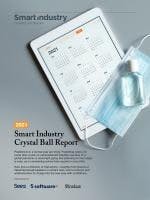Pivoting from the pandemic—COVID & the adoption of digital-transformation tools
By Dominik Wee, managing director of manufacturing and transportation at Google Cloud
Want more 2021 predictions like these? Click on the cover to get our 2021 Crystal Ball Report.
Amid COVID-19’s continued pressures on industry, manufacturers must remain agile. Digital technologies will be a focal point, with an emphasis on increased use of automation and artificial intelligence (AI), data and analytics, and sustainability.
But how are we implementing (or scaling) these approaches as we—hopefully—emerge from this pandemic? Let’s take a closer look…
Automation and AI are moving past “pilot purgatory.” Today, many manufacturing AI projects sit in “pilot purgatory,” never wholly integrating into day-to-day operations. In a new working environment, with new limitations on onsite workers and physical-distancing mandates, cloud-powered automation and AI will play an increasingly critical part in helping manufacturers maintain business continuity in 2021.
As the technology to ease the use of automation and AI rapidly advances, these tools can create more resilient operations, reduce costs, and enable manufacturers to remotely manage field equipment. They can also support quality control on products, particularly in cases of travel restrictions or lack of employee resources, and take repetitive tasks out of workers’ hands, enabling them to focus on more value added activities.
Whether it’s extending existing capabilities or further building out smart factories, AI and automation will play a larger role this year and beyond, as preventing COVID-19’s spread within plants becomes paramount.
Next…data and analytics are becoming table stakes, particularly as a foundation for machine learning; there’s never been a more critical time for manufacturers to gain more accurate views and understandings of their production data. It’s more than just connecting machines and factories; it’s about molding data so that it's in a usable form to help make business decisions and eventually power machine-learning models.
A recent study we conducted at Google Cloud showed that data and analytics are the top digital enablers/disruptive technologies that manufacturers across the globe use today, directly in response to the pandemic. Our integrated data and analytics offerings, for example, enable manufacturers to gain real-time visibility and enhanced traceability across the value chain, while gaining greater insights to improve demand and forecast accuracy. We’ll see more manufacturers become more data-driven as part of continued digital-transformation efforts.
Next…sustainability is no longer a nice-to-have, but is becoming fundamental to success: sustainability isn’t only good for the environment, it’s good for operations as well. At a time when supply chains have been disrupted and select resources may be scarce, a focus on sustainability can help reduce costs and improve output.
And with emerging cloud capabilities, there’s an opportunity to digitize new parts of the supply chain and work with green-focused IT vendors. Here at Google Cloud, for example, manufacturers reduce their environmental impact when they choose to run on our platform, as we match 100% of the energy consumed by our global operations with renewable energy. We’ve already seen many manufacturers embrace more sustainable efforts than ever before. In fact, according to the non-profit CDP, 2020 saw a 45% YOY increase of companies receiving an “A score” for environmental transparency and action.
All in all, while COVID-19 continues to pose serious threats to manufacturing and the larger world, it has been encouraging to see manufacturers rapidly adopt digital transformation tools and technologies. In 2021, we’ll continue to see the manufacturers derive benefits from these technologies and focus on digital-transformation initiatives that are scalable and help them adapt to market challenges while strengthening operations and building business resilience.

